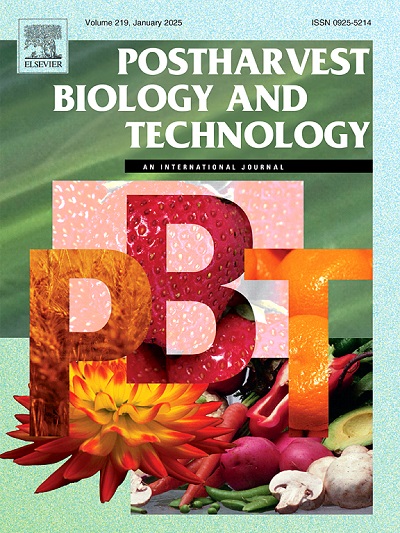Postharvest ripening combined with 1-MCP keeps the shelf quality of kiwifruit after cold storage by regulating the antioxidant system and defense enzymes
IF 6.4
1区 农林科学
Q1 AGRONOMY
引用次数: 0
Abstract
Suitable postharvest ripening and 1-MCP alone or in combination kept the shelf quality of kiwifruit after cold storage, but their synergistic effect is still unclear. In this study, we explored the impact of postharvest ripening, 1-MCP, and alone or in combination, and the use concentration and timing of 1-MCP on the shelf quality of kiwifruit after cold storage. The results showed that postharvest ripening promotes an increase in respiration rate and ethylene production rate, accumulation of TSS and TA and a decrease in firmness and flavor changes, thereby hastening the ripening and softening of kiwifruit during shelf life after cold storage. However, postharvest ripening combined with 1-MCP improved antioxidants and kept the activities of enzymes in the antioxidant system and disease resistance during shelf life after cold storage, regulating the starch degradation and keeping the soluble sugar content in kiwifruit, suppressing the rapid increase of soft rot and its ripening. In sum, postharvest ripening combined with 1-MCP kept the shelf quality of kiwifruit by regulating the antioxidant system and defense enzymes after cold storage.
求助全文
约1分钟内获得全文
求助全文
来源期刊

Postharvest Biology and Technology
农林科学-农艺学
CiteScore
12.00
自引率
11.40%
发文量
309
审稿时长
38 days
期刊介绍:
The journal is devoted exclusively to the publication of original papers, review articles and frontiers articles on biological and technological postharvest research. This includes the areas of postharvest storage, treatments and underpinning mechanisms, quality evaluation, packaging, handling and distribution of fresh horticultural crops including fruit, vegetables, flowers and nuts, but excluding grains, seeds and forages.
Papers reporting novel insights from fundamental and interdisciplinary research will be particularly encouraged. These disciplines include systems biology, bioinformatics, entomology, plant physiology, plant pathology, (bio)chemistry, engineering, modelling, and technologies for nondestructive testing.
Manuscripts on fresh food crops that will be further processed after postharvest storage, or on food processes beyond refrigeration, packaging and minimal processing will not be considered.
 求助内容:
求助内容: 应助结果提醒方式:
应助结果提醒方式:


